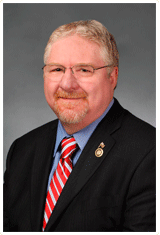This week in the Missouri Senate, we addressed an issue that came up back in 2012 during the presidential primaries. Missouri’s primary was scheduled for February of that year. However, national political parties discouraged our state, along with others, from voting that early. As a result, we held a primary that meant nothing and cost our state a substantial amount of money, and then elected the presidential candidate through local caucuses.
In many parts of the state, these caucuses were viewed as less than successful, to put it kindly. One of the main complaints about the change was it allowed only those who attended the caucuses to select the candidate. It resulted in lower voter participation, robbing many people of their say through the ballot of which candidate they preferred.
To avoid this happening in the future, the Senate approved Senate Bill 892, which moves the presidential primary to the second Tuesday after the first Monday in March. This exact date may take some tweaking as we work with county clerks who oversee these elections, but it is our goal to pass legislation this year to ensure all Missourians a clear opportunity to take part in our presidential primaries. With a final vote, the bill will go to the House for similar debate.
In related news, the Financial and Governmental Organizations and Elections Committee, which I chair, approved legislation that, if approved by voters, would establish voter ID requirements for voting in Missouri. The bill would go far in protecting the sanctity of our elections and ensuring there is no doubt regarding the validity of election results.
House Bill 1073 would require residents to provide photo ID, including a Missouri driver’s license, identification from the Armed Forces, or a document issued by the United States containing very specific information, to cast a ballot.
The legislation also provides every resident in Missouri with one form of identification to vote at no cost. It also instructs the Secretary of State to provide ample information on the new requirements, and lets those who don’t have identification when they go to vote to cast a provisional ballot, which can then be counted later upon presenting identification.
We also passed House Joint Resolution 47, which proposes a constitutional amendment specifying that general law may require a person to present government-issued photo identification to vote in person in an election. I’ve long believed that we have a duty as officials to make sure every election is legal and free from fraud. These measures now go to the Senate floor for possible debate.
The Missouri Senate spent Monday night debating Senate Bill 491, which revises, streamlines and strengthens our state’s criminal code. This task hasn’t been done since 1979, highlighting just how long overdue this is. However, it’s not a small undertaking. The original bill presented on the floor this year was more than 1,100 pages. The sponsors of the measure have since worked to reduce it to 700 pages, and provided supplemental information breaking down the changes for both legislators and the public.
To be clear, this isn’t new legislation. The bill has been worked on by multiple senators, legal experts and other interested parties for around three years now. It has been extensively vetted, and has the support of prosecutors, criminal defense lawyers, and members of the judicial branch. However, there is always room for human error. To account for any unintended consequences, the legislation wouldn’t take effect until 2017, giving the General Assembly plenty of time to revise any proposals in the bills.
Times change, and as lawmakers, it’s important to modernize laws so that they keep pace with those changes. The legislation is indeed a massive bill, and I understand the hesitancy of others to pass a measure this large and far reaching. But, it’s time for us to bring our criminal code into the 20th Century. If there are errors in the legislation, they can be addressed, but we shouldn’t shy away from a difficult, but necessary, task.
If you have any questions or comments about this or any other matter regarding your state government, please feel free to contact me at (573) 751-1503; you are also welcome to e-mail me at jay.wasson@senate.mo.gov. |



